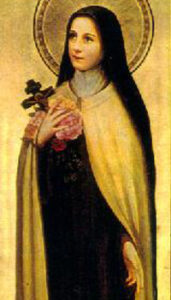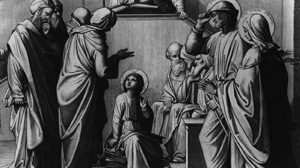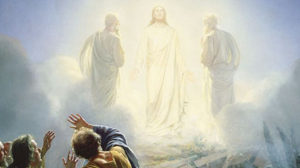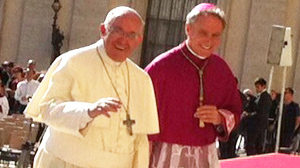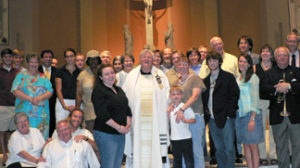Feast of Saint Thérèse of the Child Jesus
Nehemiah 8:1-4a, 5-6, 7b-12
Luke 10:1-12
Reflection:
Today is the feast of Saint Thérèse of Lisieux, popularly known as the “Little Flower.” Theresa had a brief yet remarkable life. When she was only 15 she was fiercely determined to enter the Carmelite convent at Lisieux and with the permission of Pope Leo XIII managed to do so. She would live the cloistered life of her order until her death from tuberculosis in 1897 at the young age of 24. She was “fast tracked” to canonization as a saint in 1925. Pope Pius X called her “the greatest saint of the modern era,” and Pope John Paul II declared her to be a “doctor” of the church. Theresa was not an academic or great teacher, as most “doctors” of the church have been. The pope was recognizing Theresa as a “doctor” or “teacher” for the beauty and simplicity of her “little way,” as she called it. In reflecting on her spiritual life, Theresa emphasized the need for humility and of being without pretense in any way. She was driven by an ardent love for Jesus and strove to live everyday with intense fidelity and authenticity, bringing a sense of devotion and purpose to even the most ordinary tasks of her life.
Yet Theresa’s spiritual vision ranged far beyond her convent walls. She had strong missionary zeal and longed that the gospel could spread to every corner of the earth. She declared that she wanted to be the “apostle of the apostles” and desired to help save “thousands of souls” for Christ. Remarkably, even though she had traveled any significant distance only once in her life—a trip to Rome to plead with the Pope for permission to enter the Carmelites at such a young age—and lived a brief life in a strict cloister, Pope XI in 1927 declared her to be co-patron of the missions along with St. Francis Xavier. She prayed everyday for missionaries and corresponded with some of them.
The readings for today are not special to the feast of St. Theresa, but providentially the gospel passage is the account in Luke’s Gospel (10:1-12) of Jesus sending seventy-two disciples out on mission, entering the towns where he would come and preparing for his presence. They were to travel light (“no money bag, no sack, no sandals…”). They were to cure the sick and proclaim that “the Kingdom of God is at hand for you.” This is the kind of text that inspired Theresa’s life and, even though physically confined, her spirit roamed the world.
Another Pope who has a special devotion to St. Theresa is our current Pope Francis. He, too, embodies the missionary spirit of Christ—reaching out beyond the boundaries of the church to embrace the world and those in need. In a brief speech he gave on the eve of his election as Pope he told the assembled Cardinals that sometimes people poetically speak of Jesus knocking on the door of the Church and wanting to get in…but, the Pope suggested, perhaps Jesus is knocking on the door in order to get out—out into the world to bring the joy and peace of the gospel to everyone. In his first major statement, entitled the Joy of the Gospel, Pope Francis reminded us that we are not just “disciples” but “missionary disciples”—ready to bring the witness of our faith and words and actions of healing, forgiveness, and compassion to our troubled world.
St. Theresa of Lisieux embodied that missionary spirit and the gospel today invites us to do the same.
Fr. Donald Senior, C.P. is President Emeritus and Professor of New Testament at Catholic Theological Union. He lives at the Passionist residence in the Hyde Park neighborhood of Chicago.

